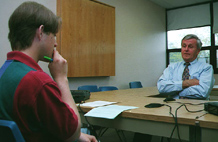| Narrators |
 |
John Leyden
Interview by Keith Traver and Becky Dangelo. Story by: Keith Traver |
A Beat Like No Other
July 3, 1931. I only missed it by one day. I guess I can have bigger birthday parties with more people. Well, let me start you off right. I was born and raised in Providence, and I did not mind that at all. I lived in a close-knit neighborhood, all working class, blue collar people. They were mostly Irish, Jewish, French and Italian. Am I glad that we got along! I guess that is what made me lucky. There was not any discrimination in our neighborhood. Everyone was treated the same. At the time, I did not realize that that was not the case everywhere you went. My parents were born in Ireland and came here in 1918. They were strong Democrats. I grew up in the basic [Catholic] private school life. I went to St. Patrick's Parochial School and then LaSalle Academy. In school, I was into a lot of athletics, baseball, track and softball in the summer. The girls' schools would invite you to their proms and other dances. I dated a couple of girls in high school, but there were no serious relationships.
After I got out of high school, I did not know what I wanted to do, so I took a job at the General Electric company in Cranston. Then in 1951, I decided to join the United States Navy. That was a proud day. I guess I joined because I had a brother in the Navy during World War II and a brother-in-law who was also in the Navy. It seemed as though they were having a lot of success with it, so I thought, why not try it, not to mention the fact that I saw it as good, steady career. That was also a dangerous time. It was during the Korean War. Although I was never actually engaged in combat, I was aware of and witness to those who were. No war is a pretty sight.
It was during my service that I considered a career in law enforcement. I had an older brother who was a police officer and many of my friends were police officers. Therefore, in 1955 when I was discharged from the Navy, I decided that that would be a good life for me, and I was right.
The job of a police officer in the sixties was not an easy one. I constantly had to deal with drug problems, riots, demonstrations, shootings, firebombs, rallies, sit-ins, rock concerts, etc. You name it and I was patrolling it.
One of the hardest parts, though, is when you have to tell a family that their son, daughter, or other relative is dead. I remember one time I saw a body that was dead due to a drug overdose. I must have turned a hundred colors. I sucked it up and did my job, but it was devastating. We were called in to assist the Campus Police [on several occasions]. They would be having a rally or whatever, and suddenly it would get out of hand and they would call us for backup. I never liked that part of my job.
There was a law enforcement change that came about while I was on the force, the Miranda decision. That really shook up the department. The Miranda decision was basically that little speech that all police officers must read before making an arrest. It says that they have the right to remain silent, the right to an attorney, the right to a fair trial, and other amendments. Some of the older men who had been on the force a long time did not like this and had a hard time adjusting to it, but I personally thought that it was a good thing.
There was one tough fact about being a police officer. We had to be nonpartisan. We could not join any political groups or movements. We could not even have any bumper stickers on our cars. We also could not endorse any political campaigns. However, I learned to live with a low-key lifestyle as far as that was concerned.
Some people say that drugs were not that big of a problem in the sixties, but more so in the seventies; some say that it was a big problem, I say that it was somewhere in the middle. I believe that the problem was prominent but the drugs were not as bad as they are today. The drugs of choice were marijuana and heroin. There was a lot of drug use. I saw it everyday as a cop. I think that that was the time to nip it in the bud, before it got as bad as it has. It was definitely an epidemic and is the reason that crime has increased as much as it has.
If I had to give some advice to the youth of today, I would tell them to respect all of your peers, no matter what color, what creed; just get along with them. I would also tell them to get a good education. Get a good one so that you can provide for you and your family and make a halfway decent living. Also, put in an honest day's work for an honest day's pay. I guess what I am trying to say is that if you try to be fair with everybody and not ridicule anybody; there would be less problems in the world.
| Glossary Words On This Page |
|---|
|
marijuana |
sit-in |